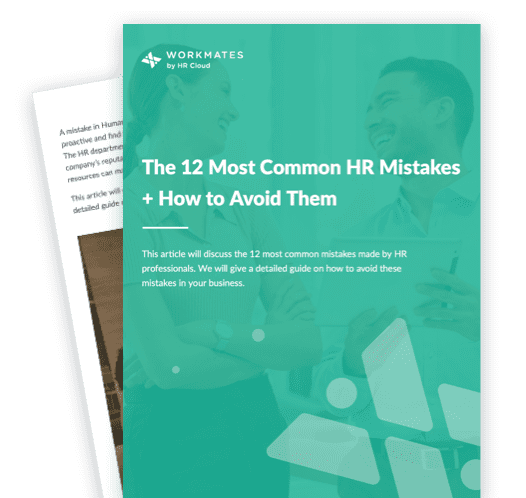Let Us Help You Engage Your Employees!
Onboard New Hires Safely, Efficiently, and Effectively.
Are You Interested in Improving Your HR Organization?
Many will counter and say that HR is not responsible for defining or creating company culture. They’ll say creating company culture is the full duty of leadership, and HR is only obligated for helping to support or maintain a culture. This is not the case.
In a perfect world, HR should be directly aligned with the rest of the leadership, defining the culture best able to position the organization as a leader in the marketplace. After all, HR is at the gate, welcoming your talent through an open door, starting with onboarding software, and it’s that talent that will drive creativity and innovation.
Tweet: HR should be aligned with leadership, defining the culture to best position the org. @HRCloud
As senior leaders define corporate culture, HR is poised to support those efforts but also provide feedback on what’s working, what makes sense, and what needs to be changed. For example, consider a Broadway play—the stage is ready to go, props in place, the script has been written. But who’s working with the actors on a daily basis, running through lines, adapting the script, and making set design changes? It’s the directors that are making those decisions. It’s HR.
You see, leaders may set the stage for the action, but realizing they are often removed from the day-to-day, they may not be aware of what the script looks like and who’s really acting out the parts, and what’s happening with the final act. As Bersin by Deloitte explains, “Leadership sets the tone and direction of a corporate culture, but HR could be the mirror for our leaders and help them see both the positive and negative elements of their decisions and behaviors.”
Defining, supporting, and encouraging corporate culture with employee engagement software, for instance, takes effort and patience; but here are 3 ways you can get started:
1. Be a Lifeguard on Duty
Just as a lifeguard stands watch, marking the areas that are safe, and redirecting swimmers as needed, HR professionals have the same responsibility to guide, direct and advocate change.
For example, from the inside, your corporate culture appears to foster workplace flexibility and encourages the use of PTO. However, during the interview day, managers seem perplexed when candidates inquire about workplace flexibility and wonder why that even matters. “They’re here to interview and get a job. Why ask now about flexibility and time off?” This type of lenient culture, advertised as a “benefit”, actually holds no weight as the messaging is perfectly clear, “We talk the talk but have no action.” Candidates are left to wonder what the corporate culture is really like and leave feeling discouraged.
As an HR professional, you observe how this disconnect in messaging affects the candidate experience but also notice the lack of consistency among leadership. If the experience doesn’t match the culture, then change must occur. Redirect your managers by incorporating training that focuses on bringing everyone back into those “safe-to-swim” areas, getting everyone on the same page with interviews, candidate experience, and how culture presentation affects the brand.
2. Stand Up
In some organizations, HR has taken a “back seat” or minimal role where corporate culture is concerned. We’re so busy keeping up with the tactical assignments, coaching and leadership have fallen off the priority list. It’s more about keeping things organized and moving forward than really being that business partner you were hired to be.
Stand up and be noticed. Understand that your ability to coach and partner is vital to ensuring organizational success. HR has long been known as a cost center that does not directly produce revenue. However, it is our opportunity to shape how business is actually performed by understanding product trends, revenue streams, market reach, and pipeline strength that will build that bench of all-stars. Without this, HR is surely nothing but a cost center. Your role is critical to the business. Understanding that and working in that capacity provides you with the power to create change and build success.
Bersin by Deloitte explains it this way, “The true value of an HR business partner role seems to be in their abilities as a coach, mentor, business advisor, and strategist. Their role in many cases is to help the business understand where the people risks and opportunities lie within their business decisions.”
Time to stand up and lead the way.
3. Perform Like No Other
Corporate culture is a combination of acceptable behaviors, actions, and thoughts. It is designed to produce a team that outperforms others, beating the competition and emerging as an industry leader. In order to sustain the culture, HR must design a process that accounts for those behaviors that eventually lead to goal achievement and product output/delivery. Without the right tools, HR software, assessments, and technology to document, success will be difficult to measure and maintain.
HR can impact culture from the defining moment of what corporate culture should be. Be aware of the ability you have to make a change. It takes patience and persistence, but you are the one that can lead the way. You were hired to do just that.
Keep Reading
Workforce Management through Tech-Based Tools: Streamlining Construction and Roofing Operations
As industries evolve, adopting innovative approaches to workforce management is essential
Skills vs Abilities in the Workplace
Modern-day workplaces are facing many challenges that were not foreseeable a few years







